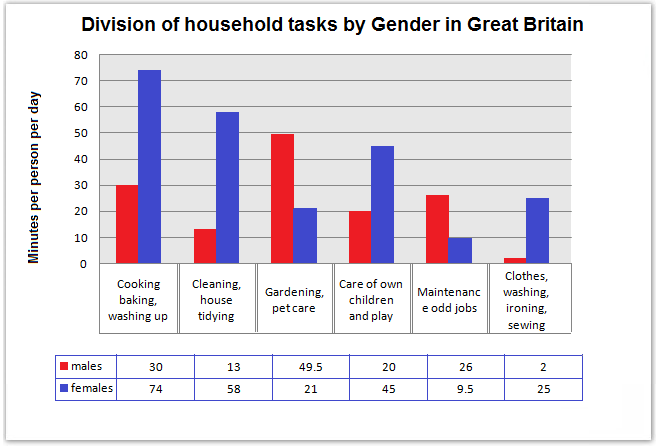» You should spend about 20 minutes on this task.
The chart shows the division of household tasks by gender in Great Britain. Summarise the information by selecting and reporting the main features, and make comparisons where relevant.
» Write at least 150 words.

Sample Answer 1
The provided graph gives information on the time spent by males and females on household work in Great Britain. As the chart shows, females spent more time cooking, cleaning, clothing, and child-rearing, while males spent more time gardening and doing odd jobs.
According to the graph, females spend more than 200 minutes per day on household work while males spend about 140 minutes per day on those short of household jobs in Great Britain. On average, females work more on household tasks like cooking, baking, cleaning, washing, tidying, child caring, and sewing. For those short of jobs, women work almost 3 times more than men do. On the contrary, males work more on gardening, pet care, and odd job maintaining more than women do and they spend the highest amount of time on gardening and pet caring while the females work their highest amount of time on cooking, cleaning, and washing.
In conclusion, females work significantly more than men on household works like cooking, washing, cleaning, and child nurturing. In contrast, men spend most of their time on household tasks like gardening, pet caring, and odd jobs compared to the time they spend on household tasks.
Sample Answer 2
The bar chart portrays the division of household chores by gender in Great Britain. The unit of measurement is minutes per person per day. Most household tasks are predominantly taken care of by women in Great Britain. Women also spend more time per day doing household work than men.
Tasks like cooking, baking, etc., are mostly taken care of by women, with 74 minutes per person per day, whereas men spend 30 minutes per person per day on such tasks. Women also significantly surpass men in cleaning, tidying, and laundry. Women spend 45 minutes per person per day taking care of children, whereas men spend 20 minutes on the same.
Men spend more time than women in gardening and pet care, where the time spent per person per day for men is 49.5 minutes and that of women is 21 minutes. Men also spend more time doing maintenance jobs, with 26 minutes per person per day, whereas women only spend 9 minutes.
Sample Answer 3
The bar graph presents information about the household tasks of Great Britain’s males and females in 6 different categories. The data source is ‘The Office for National Statistics on behalf of the Controller of Her Majesty’s Stationery Office, and it is presented in minutes for each person in a day. According to the bar graph, females in Great Britain do household tasks far more often than males, and males take care of odd jobs, gardening, and pets more than women do other household tasks.
On average, a male spends only 30 minutes each day cooking, baking, and washing, while this time for women in Great Britain is about 74 minutes per day by each woman. In the case of house cleaning, women work for 58 minutes compared to 13 minutes for men. Men spent a minor amount of time washing, ironing, and sewing clothes which was only 2 minutes per day compared to 25 minutes spent by a woman. The childcare task is also mainly done by the female, who spend more than double the time (45 minutes) than the time spent by males.
Males spend more time than females in the case of gardening, pet caring, and maintaining odd jobs. In these two categories, men spend about 50 and 36 minutes per day compared to only 21 minutes and 10 minutes per day by women, respectively.
Sample Answer 4
The chart shows the average number of minutes per day men and women in Great Britain spend on jobs around the house.
Men spend two-and-a-half hours on household tasks, whereas women pay slightly more than four hours. Women spend more than as much time doing kitchen tasks such as cooking and washing up men (74 minutes for women as opposed to 30 minutes for men. Women are also more active in cleaning the house- it takes 58 minutes of their day compared to 13 minutes for men – and childcare, where women put in more than twice as much time as men.
On the other hand, men are active in gardening and pet care, where they spend twice as women, and maintenance and DIY, on which they spend 15 minutes more than women. Women account for almost all the time spent on washing and ironing clothes. This takes them 25 minutes; men spend just 2 minutes on this task.
Overall the figures show that women spend more time on routine domestic chores than men, and men do more household maintenance, gardening, and pet care.
